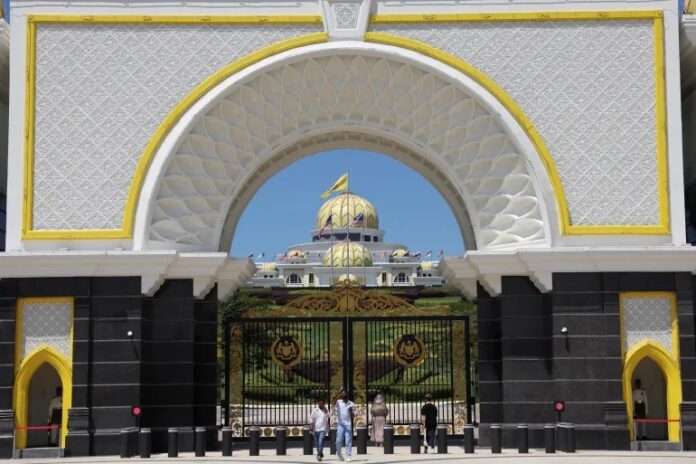The most recent time a Sultan from the state of Johor was reigning in Malaysia, the country was embroiled in a constitutional crisis as then-Prime Minister Mahathir Mohamad sought to limit the power of the judiciary. Now, as the current Johor Sultan becomes king, Malaysia is grappling with a corruption crackdown that has implicated some of the most prominent political figures of the Mahathir era, rumblings of a potential pardon for disgraced former Prime Minister Najib Razak, and ongoing political maneuvering as part of a realignment that began in 2018.
Malaysian political analyst Oh Ei Sun stated, “It is very likely that at some point, he will be called upon to adjudicate as to which side would have a more solid command of parliament. It could happen any time.”
Sultan Ibrahim Sultan Iskandar, aged 65, will be installed as the 17th Yang di-Pertuan Agong in a ceremony in Kuala Lumpur on Wednesday, which will be broadcast live on state television. He will serve for five years as part of Malaysia’s unique system of rotational monarchy under which the country’s nine hereditary rulers take turns to be the Yang Di-Pertuan Agong.
While the king is a constitutional monarch who acts as the head of state and commander of the armed forces, the upheaval that followed the historic election in 2018, during which the once-dominant United Malays National Organisation (UMNO) was defeated for the first time since independence, has seen the monarch playing a more prominent role in the country’s politics.
At the time of that defeat, King Muhammad V from the northeastern state of Kelantan, was on the throne, and helped ensure a smooth transfer of power. When the then-49-year-old chose to resign, his successor, King Sultan Abdullah Sultan Ahmad Shah from the central state of Pahang, used the monarch’s discretionary powers to name the country’s prime ministers in 2020 and 2021, and after the election in 2022 when no single party won a parliamentary majority.
As Sultan Ibrahim is installed, Malaysia is in a period of relative calm, with Prime Minister Anwar Ibrahim at the head of a so-called “unity” government that includes his one-time rivals in UMNO as well as representatives from the Borneo states of Sabah and Sarawak. However, some politicians continue to vie for power amid deep divisions in Malaysian society, and a corruption crackdown has ensnared Daim Zainuddin, the once powerful right-hand man to Mahathir, Malaysia’s longest-serving prime minister.
There is speculation about the potential release of former Prime Minister Najib Razak, who is nearly 18 months into a 12-year sentence for corruption related to the multibillion-dollar scandal at state fund 1MDB. Najib has applied for a full pardon, and there is talk of his potential release despite multiple ongoing court cases over the scandal.
While some believe that Najib’s release could help address some of the country’s political divisions as he remains popular among some ethnic Malays, who make up more than half the population and have increasingly voted for conservative religious and nationalist parties, analysts caution that such a move risks alienating those who want to see reform and undermining Malaysia’s international reputation.
Sultan Ibrahim has previously spoken out against the “Arabisation” of Malay culture and stressed the need for moderation in a country where there are large populations of ethnic Chinese and Indians, most of whom are not Muslim. Independent analyst Asrul Hadi Abdullah Sani believes that once Sultan Ibrahim moves into the palace, he “will not be shy” about offering his views to Prime Minister Anwar if he is unhappy.
The two men appear to have a close working relationship and share similar concerns, particularly regarding the need to tackle corruption and boost the economy and investment. This month, Singapore and Malaysia reached a preliminary agreement to establish a Singapore-Johor special economic zone and improve connectivity across the border, one of the busiest in the world.
The Sultan has already triggered controversy in an interview with Singapore’s Straits Times newspaper, emphasizing the need to tackle corruption and control the “machinations of self-serving politicians” in a swipe at the political maneuvering that has rocked the country in recent years.
Married with six children, Sultan Ibrahim is one of Malaysia’s wealthiest men with interests in internet services to property, including a stake in the troubled China-backed Forest City project. Known for his annual road trip around Johor to meet the state’s people, conducted one year from a custom-made Mack truck, he has a passion for fast cars and aircraft. His eldest son, Tunku Ismail Sultan Ibrahim, has achieved acclaim for the state’s dominance of national football with Johor Darul Ta’zim FC (JDT) winning the super league for 10 years in a row.
The family has also shown media savvy, providing an insight into royal life with hundreds of thousands of followers on social media platforms including Facebook, Instagram, and YouTube. Posts have included videos of the sultan joking as he meets people around Johor and a film on the recruitment process for the Royal Johor Military Force, the state’s private army. On Wednesday, attention will turn to Sultan Ibrahim, as police have said they expect as many as 30,000 people to line the streets of Johor Bahru, the state capital, to bid farewell to the sultan as he makes his way to the airport for his flight to Kuala Lumpur. Well-wishers are also expected in the capital as the installation ceremony is broadcast live on television.

